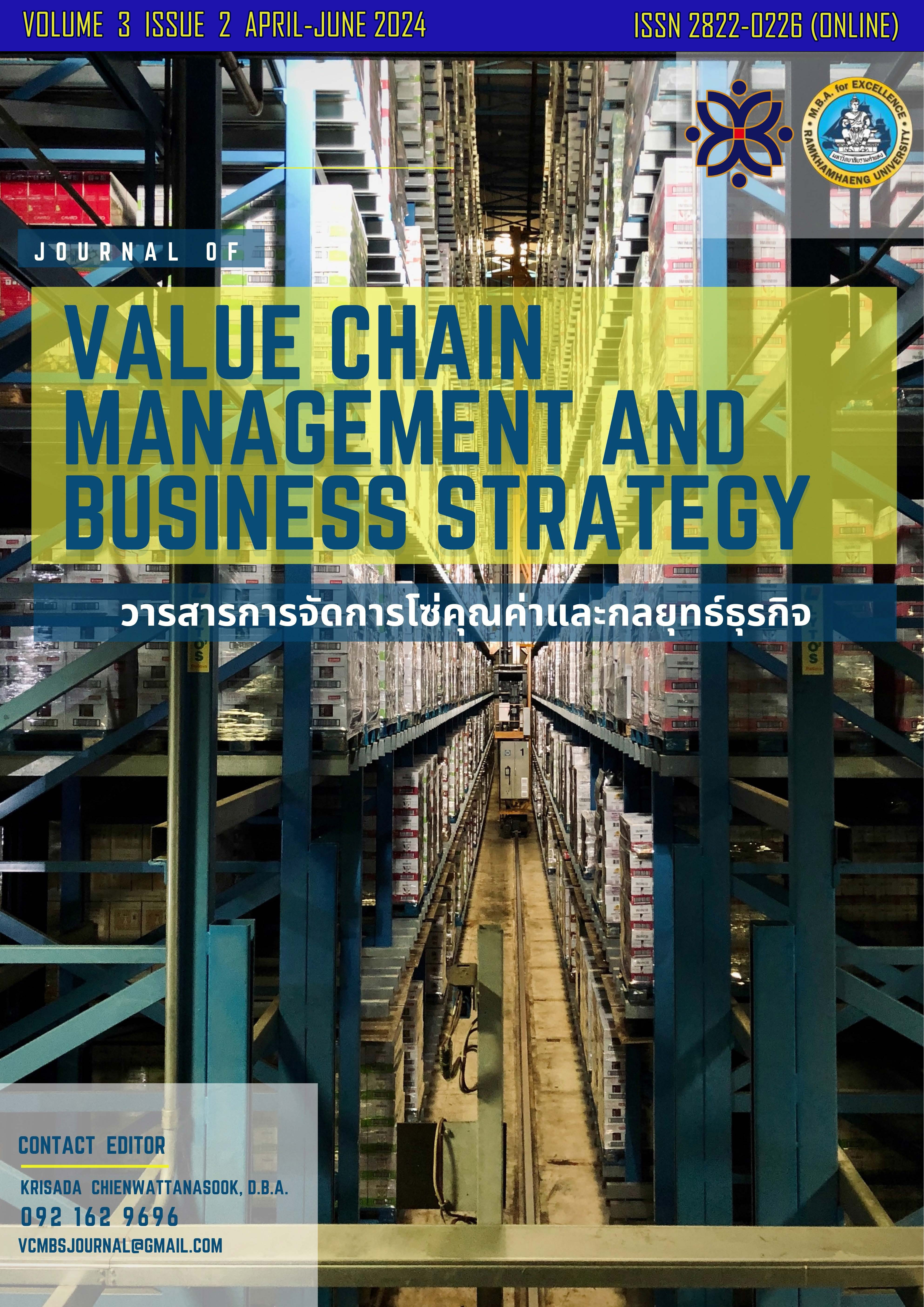QUALITY OF LIFE FACTORS AFFECTING ORGANIZATIONAL ENGAGEMENT OF PESTICIDE COMPANY EMPLOYEES IN BANGKOK AND PATTAYA CITY CHONBURI
Abstract
The purpose of this study is to compare the organizational commitment of pesticide company employees in Bangkok and Pattaya City, Chonburi Province based on personal factors and to examine the quality-of-life factors that influence the organizational commitment of pesticide company employees in Bangkok and Pattaya City, Chonburi Province. The sample for this research consists of 192 employees of pesticide companies in Bangkok and Pattaya City, Chonburi Province, selected using convenience sampling. The data was collected using a questionnaire. The data were analyzed using frequency, percentage, mean, standard deviation and hypothesis tests such as t-test, one-way analysis of variance and multiple regression analysis.
The results showed that respondents with different levels of education, work experience, and average monthly income had statistically significant differences in organizational commitment among employees of pesticide companies in Bangkok and Pattaya City, Chonburi Province at the .05 level. In addition, quality of life factors such as pride in the company, career advancement and job security, company charter, and fair and adequate compensation significantly influenced the organizational commitment of pesticide company employees in Bangkok and Pattaya City, Chonburi Province at the .05 level with a predictive power of 67.8%.
References
กรมสุขภาพจิต. (2564). ผู้ป่วยโควิด-19 กับผลพวงด้านสุขภาพในระยะยาว. https://dmh.go.th/news-dmh/view.asp?id=30698
จิตติรัตน์ แสงเลิศอุทัย. (2560). คุณภาพของเครื่องมือที่ใช้ในการวิจัย. วารสารวิจัยและพัฒนาหลักสูตร, 7(1), 1-15.
ชนิกานต์ กระแก้ว และบุษกร วัชรศรีโรจน์. (2561). ปัจจัยที่มีผลต่อความผูกพันต่อองค์การและความสุขในการทำงานของพนักงานในธุรกิจสินค้าอุปโภคบริโภค: กรณีศึกษาบริษัทจัดจำหน่ายสินค้าอุปโภคบริโภคแห่งหนึ่งในเขตกรุงเทพมหานคร. วารสารรัชต์ภาคย์, 12(27), 117-127.
นทีรัย เกรียงชัยพร และอุทัย เลาหวิเชียร. (2562). ความสัมพันธ์ระหว่างระดับคุณภาพชีวิตงาน ความผูกพันต่อองค์การ และพฤติกรรมการปฏิบัติงานของพนักงานการประปาส่วนภูมิภาค. วารสารรัชต์ภาคย์, 13(30), 71-82.
พัชร์หทัย จารุทวีผลนุกูล, ธัญวฤณ วัทโล, และวิลาสิณี สุดประเสริฐ. (2563). ปัจจัยที่ส่งผลต่อความผูกพันต่อองค์การของพนักงาน บริษัท เอสเอสเค โลจิสติกส์ จำกัด. วารสารวิชาการสังคมศาสตร์เครือข่ายวิจัยประชาชื่น, 2(3), 27-39.
มัทนา สังกะเพศ และชญานิกา ศรีวิชัย. (2560). ความสัมพันธ์ระหว่างคุณภาพชีวิตในการทำงานกับความผูกพันต่อองค์การ ตามความคิดเห็นของพยาบาลวิชาชีพในโรงพยาบาลชุมชน จังหวัดปทุมธานี. วารสารวิชาการมหาวิทยาลัยอีสเทิร์นเอเชีย ฉบับวิทยาศาสตร์และเทคโนโลยี, 11(2), 227-238.
สถาบันวิจัยเพื่อการพัฒนาประเทศไทย. (2566). ข้อจำกัดในการแก้ไขปัญหาฝุ่น PM2.5. https://tdri.or.th/2023/03/pm2-5-thailands-solutions/
อรุณ ศรีระยับ, อรุณ รักธรรม, เพ็ญศรี ฉิรินัง, และชาญ ธาระวาส. (2563). คุณภาพชีวิตในการทำงานกับความผูกพันต่อองค์กร. วารสารเครือข่ายส่งเสริมการวิจัยทางมนุษยศาสตร์และสังคมศาสตร์, 3(3), 120-131.
Agus, A., & Selvaraj, R. (2020). The mediating role of employee commitment in the relationship between quality of work life and the intention to stay. Employee Relations: The International Journal, 42(6), 1231-1248.
Bagtasos, M. R. (2011). Quality of work life: A review of literature. DLSU Business & Economics Review, 20(2), 1-8.
Buchanan, B. (1974). Building organizational commitment: The socialization of managers to work organizations. Administrative Science Quarterly, 19(4), 533-546
Dhingra, M., & Dhingra, V. (2020). An empirical research on relationship between adequate and fair compensation and quality of work life. Journal of Statistics and Management systems, 23(2), 317-331.
Mercurio, Z. A. (2015). Affective commitment as a core essence of organizational commitment: An integrative literature review. Human resource development review, 14(4), 389-414.
Ruževičius, J. (2014). Quality of life and of working life: Conceptions and research. In 17th Toulon-Verona International Conference (pp. 28-29). Liverpool John Moores University.
Sinval, J., Sirgy, M. J., Lee, D. J., & Marôco, J. (2020). The quality of work life scale: validity evidence from Brazil and Portugal. Applied research in quality of life, 15(5), 1323-1351.
Steers, R.M. (1977). Antecedents and outcomes of organizational commitment. Administrative Science Quarterly, 22(3), 46-56.
Walton, R. E. (1973). Quality of working life: What is it? Slone Management Review, 15, 11-21.
Yamane, T. (1973). Statistics an introductory analysis. Harper & Row.
Downloads
Published
How to Cite
Issue
Section
License
Copyright (c) 2024 Journal of Value Chain Management and Business Strategy

This work is licensed under a Creative Commons Attribution-NonCommercial-NoDerivatives 4.0 International License.




